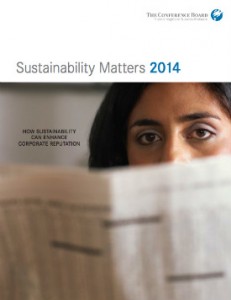 Sustainability Matters 2014, a report from The Conference Board (TCB), is full of interesting perspectives and metrics. Three of the sections I found to be particularly interesting, “Sustainability and Firm Performance,” “The Link Between Sustainability and Brand Value” and “Communicating Sustainability to Enhance Corporate Reputation.”
Sustainability Matters 2014, a report from The Conference Board (TCB), is full of interesting perspectives and metrics. Three of the sections I found to be particularly interesting, “Sustainability and Firm Performance,” “The Link Between Sustainability and Brand Value” and “Communicating Sustainability to Enhance Corporate Reputation.”
Sustainability initiatives impact on the bottom line had long been anecdotal until we began to see solid indicators around environmental issues, in particular, being material. The report illustrates a new business case model “in which sustainability initiatives are assessed in an economic manner and pursued on the basis of a clear link to financial performance.” Through a survey done by McKinsey and Boston College, they cited, “innovation, new products, new customers, and new markets as specific areas where sustainability factors have demonstrable impact on overall organizational growth.”
I have written much about cause marketing and philanthropy in regards to brand, which is very consumer focused. This section of the report discusses brand value and its connection with environmental, social and governance (ESG) performance. TCB takes two studies, one by CSRHub and the other from the Brand Strength Index to look at over 1,000 companies from 54 countries. “Brand value and sustainability are related, and a company that seeks to do well in one area should consider also investing in the other.” Relating to the treatment of people, both employees and third parties, this study shows that “ratings in this area are higher when a company is more transparent and discloses its behavior.” Employee engagement programs, in my opinion, adds so much value and it’s great to see this report validate what has been an important focus in my work. “Many studies have shown that consumer brand impressions are heavily influenced by the behavior of a company’s employees. Polite, knowledgeable service people; employees who actively serve in community organizations; and personal contact between employees and customers can directly affect how a brand is perceived.”
Communicating corporate social responsibility initiatives of a company is critical and in this section on corporate reputation there is a fascinating diagram charting companies by the Sustainability Reality Score on the x-axis and the Sustainability Perception Score on the y-axis. The quadrants are labeled Leaders in the upper right going clock wise Promoters, Laggards and Challengers. Some of the positions made sense to me based on my knowledge of the companies, such as IBM as a Leader and Facebook as a Laggard. Others, from a perception standpoint rated high such as Apple, where their reality score is low (Steve Cook is doing better than his predecessor, especially with employee engagement, but they have a long way to go to be a CSR Leader). Clearly, as stated, their positive score is based on the popularity of their products and the “halo” effect that goes with it. The companies, Starbucks and Marriott, two that I think of having solid CSR practices, and are also known for positive practices, are high on the latter but surprising to me, they are on the lower half of the reality score. I am curious as to the data that lead to these findings. Here are the key takeaways from this section:
• Treat Sustainability as an integral part of business strategy, not just a compliance issue.
• Take responsibility for the impact of internal operations and those of associated entities, such as supply chain partners.
• Implement GRI (Global Reporting Initiative) standards for reporting and ensuring that the materiality of sustainability issued is understood by all stakeholder groups.”
• Integrate sustainability into brand and client value propositions.”
• Focus their operational initiatives and communications on carefully selected themes tied to the core of the business.”
The CEO as the steward of the company’s reputation is a topic towards the end of the report. While I agree the CEO should have this role, I also firmly believe that the CEO has to be the steward of good corporate citizenship, owning CSR initiatives and integrating them into the company. True, positive reputation comes from the real integrity of the business. The CEO sets the tone.
http://www.conference-board.org/publications/publicationdetail.cfm?publicationid=2683
